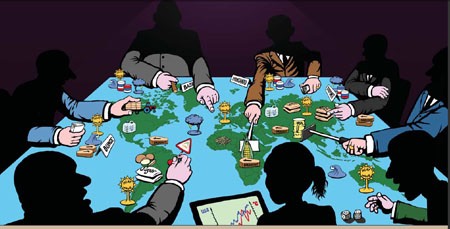
IMF: "Instead of delivering growth, some neoliberal policies have increased inequality, in turn jeopardizing durable expansion
Milton Friedman in 1982 hailed Chile as an “economic miracle.” Nearly a decade earlier, Chile had turned to policies that have since been widely emulated across the globe. The neoliberal agenda—a label used more by critics than by the architects of the policies—rests on two main planks. The first is increased competition—achieved through deregulation and the opening up of domestic markets, including financial markets, to foreign competition. The second is a smaller role for the state, achieved through privatization and limits on the ability of governments to run fiscal deficits and accumulate debt.
However, there are aspects of the neoliberal agenda that have not delivered as expected. Our assessment of the agenda is confined to the effects of two policies: removing restrictions on the movement of capital across a country’s borders (so-called capital account liberalization); and fiscal consolidation, sometimes called “austerity,” which is shorthand for policies to reduce fiscal deficits and debt levels. An assessment of these specific policies (rather than the broad neoliberal agenda) reaches three disquieting conclusions:
•The benefits in terms of increased growth seem fairly difficult to establish when looking at a broad group of countries.
•The costs in terms of increased inequality are prominent. Such costs epitomize the trade-off between the growth and equity effects of some aspects of the neoliberal agenda.
•Increased inequality in turn hurts the level and sustainability of growth. Even if growth is the sole or main purpose of the neoliberal agenda, advocates of that agenda still need to pay attention to the distributional effects.”
En hier past een uittreksel uit Carnaval et cannibale van Jean Baudrillard:
“Le véritable scandale n’est pas tant dans le cynisme technocratique que dans la rupture d’une règle de notre jeu social et politique: aux uns la corruption, aux autres la contestation. Si les corrumpus ne respectent plus ce protocole, s’ils étalent ouvertement leur jeu, sans même nous faire la grâce de l’hypocrisie, alors le mécanisme rituel de la dénonciation nous échappe – le capital mis a nu par les capitalistes mêmes.”
Vertaling: “Het echte schandaal berust niet zozeer op het technocratische cynisme als in de breuk met de sociale en politieke spelregel: de ene zijde is corrupt, de andere protesteert daartegen. Als de corrupten dit protocol niet meer respecteren, als ze hun spel openlijk uitleggen, zonder ons zelfs hun hyprocrisie te gunnen, dan missen we het rituele mechanisme van de beschuldiging - het kapitaal wordt door de kapitalisten zelf blootgelegd.”
Nog anders gezegd, het IMF geeft een fout toe, en schakelt daardoor alle kritiek uit. Onze mainstream media hebben bovenstaand bericht van het IMF niet eens gemeld. Men wist het al lang, en het toegeven van de fout zal geen enkele wijziging in het beleid van het IMF veroorzaken. Het IMF is corrupt en de neoliberale maatschappij heeft dit altijd al geaccepteerd, ja zelfs geëist. Het is alleen nooit met zoveel woorden gezegd. Nu veroorzaakt deze schuldbekentenis geen enkele reactie. Men is de hypocrisie voorbij, men kan nu openlijk zeggen dat het beleid van het IMF fout was. Men kan gewoon doorgaan met het maken van dezelfde fout. Elke vorm van protest is daarmee uitgeschakeld. Onze media en politici slapen verder, zonder gewetenswroeging; nee, het is beter om het eigen mediatieke en politieke falen en verzwijgen te verhullen in nog meer zwijgen.
